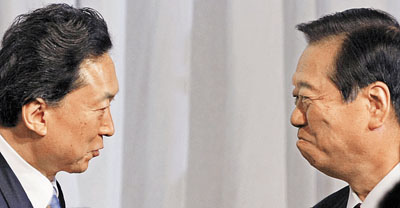The glow of victory often obscures the tension of political purpose and personal ambition. For even in its moment of triumph, the DPJ’s victory seemed infused with the prescience of the current turmoil racking the party. The pre-election divisions between the Hatoyama-Ozawa faction and the anti-Ozawa factions that had coalesced around Kan, Edano and Maehara had been fraught with tensions. Their truce was tactical, and their focus, on wining power at any cost. It was always going to be a precarious balancing act for any leader of the DPJ to maintain the cohesion of such an ideologically promiscuous group. Its fundamental weakness would be that stability required a continual tour de force in order to maintain a precarious balance among its ambitious members.
It is possible to discern a certain consistency in Ozawa’s political calculations. He has continually sought to maintain the ideological balance within the DPJ, has shown a remarkable attunement to the dominant mood of the party, and has an ambition for personal advancement that has few, if any, modern parallels in postwar history. Ozawa’s challenge to Kan is novel; he has seemingly read the situation and Kan’s weakness all too perfectly. Kan’s strategic errors and retreat from the consumption tax increase provided the opportunity for Ozawa to move before he became irreparably weakened by financial scandal. Abandoned by the public at the recent election, a fissure opened within the DPJ over the legacy of Hatoyama and Ozawa and the course that Kan and his allies have proposed.
Ozawa’s resignation in the months before the election was a tactical retreat from which he proceeded to wage an insurgency of pin pricks against the Kan administration at every opportunity. Ozawa patiently awaited changes in the balance of power within the DPJ, and when the opportunity came, he moved purposefully to subtlety alter the constellation of interests, and hence the balance, among the different ideological and political factions. Yet his latest maneuver for power seems strangely rigid and dogmatic, the realism he had once been renowned for, now barely discernable. Shorn of the great confidence that once infused his political calculations, Ozawa’s challenge reflects a refusal to allow his successors to define the legacy he had forged. He understands too well the importance of a leader’s legacy in legitimating the interests and issues of the present and the future. Yet legacies have a way of posing the problems of their conception for they speak directly to man’s ambition transfigured into a reflection of the party and state he longs to lead.
There is a certain kind of criticism of Ozawa that can stem from closeness in time. He has changed his ideological and political stripes too many times, renounced his past, present and future once too often that his contemporaries and opponents could be forgiven for mistaking his political ideals as nothing more than the epitome of supreme convenience. Yet he possesses an extraordinary grasp of the fundamental nature of the evasions and omissions of postwar Japanese politics which have enabled him to maneuver, from the shadow of opposition to government, carefully moving between allies and opponents, until one become the other.
Ozawa has understood better than any politician of his generation the question of balance. But his great weakness has been that his understanding has always been strangely incomplete. For Ozawa the question of balance was always a mechanical conception; missing from his political calculations is an understanding of limitation and renunciation. He mistook technical virtuosity and manipulation for the consciousness of a political solution, and in the process succeeded in undermining the experiment he himself had painstakingly constructed. He has been a political leader whom Japan has never fully embraced and yet, who over the course of two decades, has profoundly altered the dimension of its political discourse, and broke the LDP’s once unassailable machine.
Ozawa’s challenge to Kan represents the apogee of the ‘Ozawan Moment’ in Japanese politics. It is a moment characterized by deep immoderation for power and by the overwhelming hubris of Ozawa himself. The decline of the DPJ, and even of Japanese politics, results at this moment from the failure to reconcile the fundamental tensions of political purpose with Ozawa’s great ambition to rule. His concern with the legacy of the DPJ emerges finally as nothing more than an expedient to secure the presidency of the party. His famed political maneuvers and brilliance, and his insistence that such brilliance entitles him to power, appear now with all the subtlety of brutal force. Even at this apogee of the ‘Ozawan Moment’ one man, no matter the virtuosity of his political skill, cannot forever induce events on the stage to follow his personal direction. Ozawa’s ambition appears at this moment at its most uncompromising, and thus at its most self-defeating, capable of destroying the DPJ, and with it Ozawa’s legacy more fully than Kan and the anti-Ozawa forces could ever hope. For it is the nature of great ambition, shorn of principle, that it cannot forever evade the question of its purpose and thus its ultimate fate.
What was it Aeschylus wrote about lions in the city?
Andrew Levidis is a PhD candidate at the University of Melbourne and a Monbukagakusho scholar of Kyoto University.

